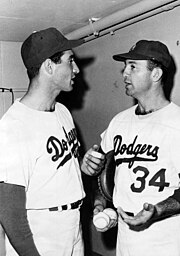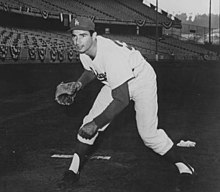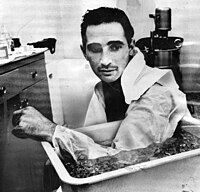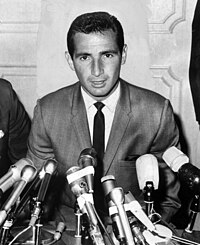Sandy Koufax
Koufax, along with teammate Don Drysdale, became a pivotal figure in baseball's labor movement when the two staged a joint holdout and demanded a fairer contract from the Dodgers before the 1966 season.
In 1979, Koufax returned to work as a pitching coach in the Dodgers' farm system; he resigned from the position in 1990 but continues to make informal appearances during spring training.
[3] As a student, he was enrolled in a liberal arts major with the intention of transferring to the architectural school,[8] and was a member of Pi Lambda Phi, a historically Jewish fraternity.
[9][10] One day, Koufax overheard Jucker, who also coached the college baseball team, planning a last-minute road trip in his office which started in New Orleans.
"[21][22] After the tryout, Koufax's father negotiated the contract with the Dodgers, asking for a bonus which would allow his son to finish college if his baseball career failed.
Teammate Joe Pignatano remarked, years later, that as soon as Koufax threw a couple of balls in a row, Walter Alston would signal for a replacement to start warming up in the bullpen.
[40] Notably, teammates Jackie Robinson and Roy Campanella both clashed with Alston on Koufax's usage, noting the young pitcher's talent and objecting to him being benched for weeks at a time.
[38] After the last game of the season, frustrated with his lack of progress as well as resentment towards Dodger management, Koufax threw his equipment into the trash, having decided to quit baseball and devote himself to an electronics business in which he had invested.
"[57] During the offseason, Koufax underwent tonsillectomy due to recurring throat issues and, as a result, reported to spring training thirty pounds under his normal playing weight.
[a][61] Additionally, Dodgers statistician Allan Roth helped Koufax tweak his game in the early 1960s, particularly regarding the importance of first-pitch strikes and the benefits of breaking pitches.
[3][62] On March 23, Koufax was chosen to pitch in a B-squad game against the Minnesota Twins in Orlando, Florida, by teammate Gil Hodges who was acting manager for the day.
[69] On June 13, against the Braves at Milwaukee County Stadium, he hit his first career home run off future Hall of Famer Warren Spahn, providing the winning margin in a 2–1 victory.
"[93] However, during his meeting with Dodgers general manager Buzzie Bavasi, the latter stated Koufax had not earned such a big raise, using numerous excuses to justify his stance, including that he had not pitched enough innings the year before.
Shocked and angry that the story painted him as greedy, Koufax responded in an interview with Frank Finch of the Los Angeles Times that he did neither of those things, saying: "I've been hurt by people I thought were my friends.
[100][101] On August 8, during a game against the Milwaukee Braves, Koufax jammed his pitching elbow while diving back to second base to beat a pick-off throw by Tony Cloninger.
[d][103] With the Dodgers out of the pennant race, Koufax did not pitch again that season, finishing with a 19–5 win-loss record and leading the National League with a 1.74 ERA and seven shutouts, and the majors with a 2.08 FIP.
On March 30, however, he woke up the morning after pitching a complete game against the Chicago White Sox to find his entire left arm swollen and black and blue from hemorrhaging.
[108] The game, which came in the middle of a heated pennant race, had been tense since it began, with Marichal brushing back Dodgers outfielder Ron Fairly and shortstop Maury Wills, and Koufax retaliating by throwing over the head of Willie Mays.
[112] The game also set a record for the fewest hits in a major league contest as Cubs pitcher Bob Hendley pitched a one-hitter and allowed only two batters to reach base.
[e][116] Koufax garnered national attention when he declined to start Game 1 of the 1965 World Series as it clashed with Yom Kippur, the holiest day in the Jewish calendar.
[125] Meanwhile, Hayes unearthed a state law, the result of the De Havilland v. Warner Bros. Pictures case, that made it illegal to extend personal service contracts in California beyond seven years; he began to prepare a lawsuit which to challenge the reserve clause.
[167] During his tenure, he worked with a number of pitchers, including Orel Hershiser, Dave Stewart, John Franco, Bob Welch, and fellow Hall of Famers Don Sutton and Pedro Martínez.
[168][169] Koufax, with the help of former teammate Roger Craig, taught himself how to throw a split-finger fastball, a popular pitch in the 1980s, in order to be able to teach it to pitchers in the Dodgers' minor league system.
[170] He resigned from his position in 1990, saying he was not earning his keep as the Dodgers had cut back his workload; most observers, however, blamed it on his uneasy relationship with manager Tommy Lasorda who reportedly resented Koufax working with his pitchers.
"[176] Koufax cut ties with the Dodgers as both the team and the newspaper were, at the time, owned by Rupert Murdoch's News Corp and he did not want to help promote any of their subsidiaries.
[206] In his opening remarks, President Barack Obama directly acknowledged the high esteem in which Koufax is held within the Jewish community: "This is a pretty... distinguished group.
[207] That same year, he was one of two main subjects of the film Jews and Baseball: An American Love Story, alongside Hall of Famer Hank Greenberg of the Detroit Tigers.
Cheesy Kawano, wife of clubhouse manager Nobe who used to help her husband out at Dodger Stadium, noted that Koufax was the only player on the team who knew her name and asked after her.
In the 1975 film, One Flew Over the Cuckoo's Nest, after not being allowed to watch it on television, Jack Nicholson's character Randle McMurphy narrates an imaginary account of the 1963 World Series in which Koufax gets knocked out of the game after surrendering a double and two home runs to three consecutive Yankees.
"[221] His grandfather Max Lichtenstein, an immigrant with socialist views, instilled Jewish values and culture in his grandson, often taking Koufax to the Yiddish theatre and concerts.

















